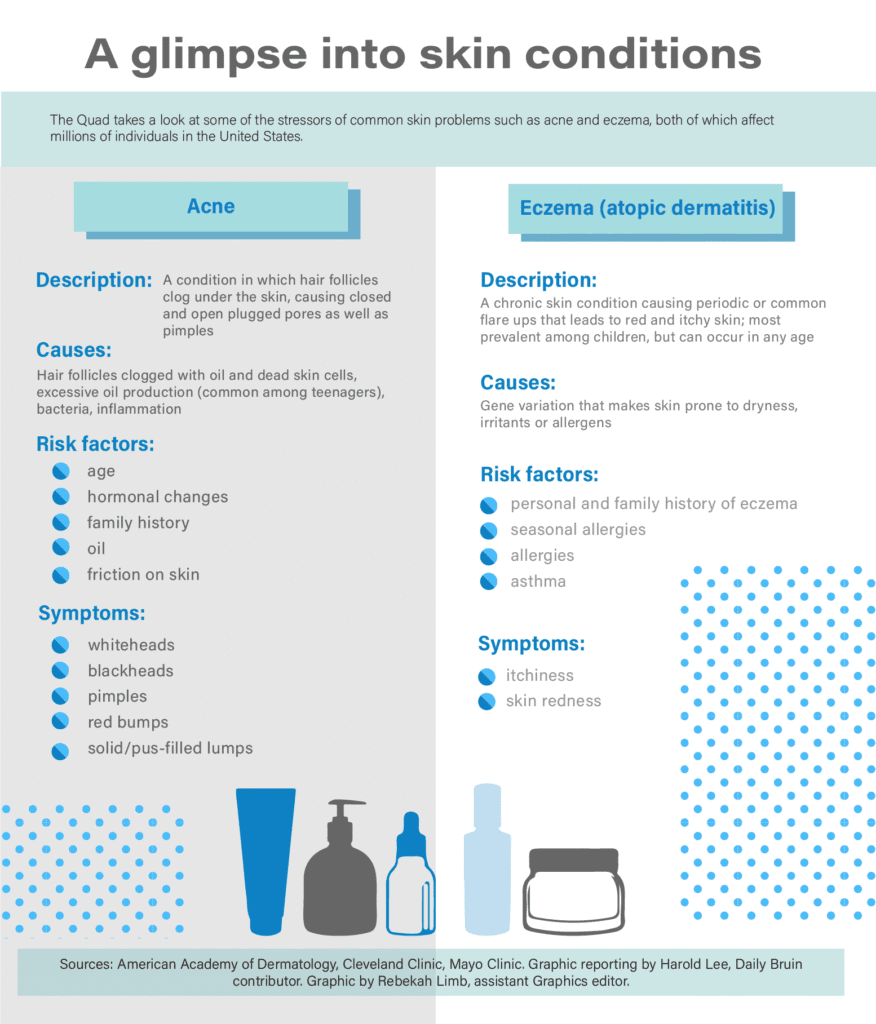Understanding Skin Conditions in Students: Eczema and Acne
Navigating the complexities of academic life can be overwhelming for students. Juggling coursework, club commitments, and internships often leaves little room for thoughts about skin care. However, for those suffering from chronic skin conditions like eczema or acne, managing their skin health is imperative.
Common Skin Issues Among Students
According to the American Academy of Dermatology, eczema and acne rank among the most prevalent skin issues in the United States. University students, such as Bruins at UCLA, are not immune to these challenges.
Eczema: Triggers and Impact
Eczema, a condition that causes itchy and inflamed skin, can be influenced by various factors:
- Environmental Conditions: Changes in weather, extreme temperatures, and exposure to chlorinated water can exacerbate symptoms. For instance, Leanna Phan, a fourth-year student, noted that her eczema flares up when swimming due to chlorine exposure, as well as during extreme weather conditions.
Understanding Acne: Causes and Exacerbators
Acne, another widespread concern among students, is not just a result of puberty or poor hygiene. Dr. Erin Gleason, a primary care provider, indicates that factors contributing to acne severity include:
- Genetics: A family history of acne increases the likelihood of developing it.
- Dietary Choices: Certain foods can trigger breakouts.
- Stress: High-stress situations, such as exams, can lead to increased sebum production and inflammation.
Dr. Teo Soleymani, a dermatologist, elaborates on the relationship between psychological stress and skin conditions. He explains how stress hormones like cortisol can lead to more severe outbreaks, especially during high-pressure times like finals week.
The Interplay Between Stress and Skin Conditions
Dr. Emily Newsom, a dermatologic surgeon, underscores the interconnectedness of stress, the immune system, and skin health. Inflammatory skin diseases such as acne and eczema are closely tied to how our bodies react to stressors:
- High stress can throw the immune system off balance, triggering inflammation.
- Managing stress through self-care practices can significantly improve skin conditions.
Environmental Concerns Affecting Skin
While genetic and psychological factors play significant roles, external factors like pollution and allergens can influence skin health as well. Dr. Soleymani notes that while daily grime can worsen skin conditions, more research is needed to delineate the impacts of environmental smog.
Managing Skin Conditions: Strategies and Resources
Navigating skin issues can be daunting, but various strategies may help students manage their conditions:
-
Practice Self-Care: Adequate sleep and a balanced diet can alleviate symptoms.
- Tip: Maintain a regular sleep schedule for improved health and skin vitality.
- Seek Professional Help: It’s vital for students experiencing skin problems to reach out to dermatology experts for guidance:
- Local dermatologists often appreciate engaging with students interested in dermatology.
- Utilizing dermatology resources available on campus can provide targeted help.
The Psychological Toll of Eczema and Acne
Chronic skin conditions can negatively affect self-esteem and social interactions. Dr. Jeremy Davis highlights how issues like eczema and acne can hinder students’ confidence and participation in social activities.
- Cycle of Stress: Students may feel self-conscious about their appearance, which can exacerbate existing skin conditions, creating a detrimental cycle.
Conclusion
Understanding and managing chronic skin conditions such as eczema and acne is pivotal for students. By acknowledging the impacts of environmental factors, stress, and biological predispositions, those affected can take proactive steps to mitigate their effects. Seeking help and practicing self-care can lead to improved skin health and, ultimately, a better overall college experience.
For more information on skincare and dermatology, check out resources at UCLA Health.


